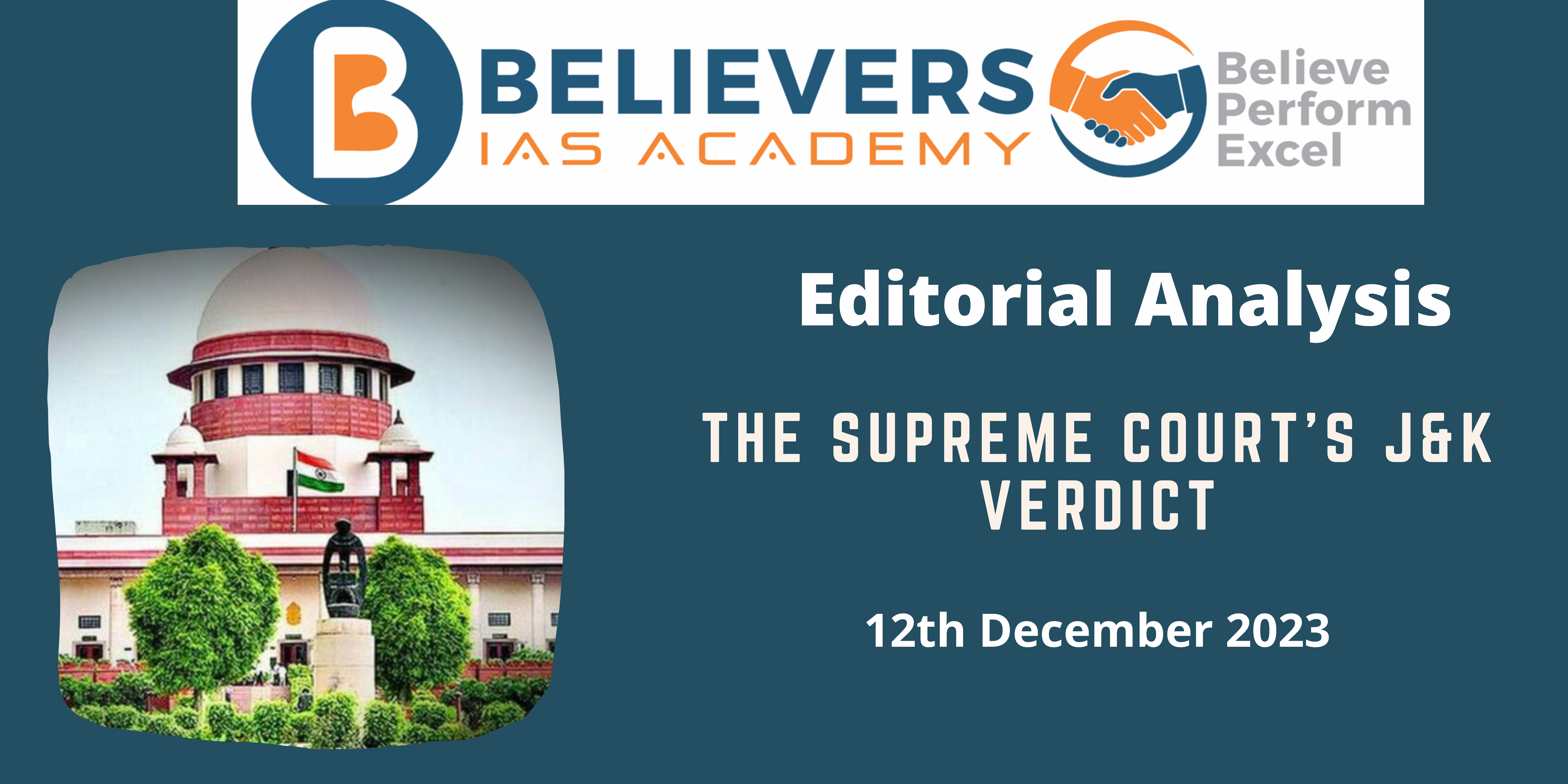The Supreme Court’s J&K verdict
Context:
The recent Supreme Court verdict affirming the abrogation of Jammu and Kashmir’s special status under Article 370, expressing concerns about its impact on federalism, democratic norms, and legal processes. It emphasizes the potential repercussions of the verdict on the rights of States in India.
Relevance:
GS – 02 (Indian Constitution, Government Policies & Intervention, Federalism, Parliament)
Prelims
- Article 370 and 35(A)
- Presidential Order
- Ordinances
- President and his functions
Mains Question:
Evaluate the Supreme Court’s verdict on the abrogation of Article 370 in Jammu and Kashmir, focusing on its implications for federalism, democratic norms, and the rights of States in the country. (250 words)
Article 370:
Article 370:
- Article 370, a constitutional provision, bestowed special status upon Jammu and Kashmir.
- This provision, located in Part XXI of the Constitution, was initially conceived as a temporary measure, linked to the formulation and adoption of the State’s constitution.
- It limited the legislative powers of the Indian Parliament concerning J&K.
Erosion of Article 370:
- Key leaders like Pandit Nehru and Home Minister Gulzari Lal Nanda acknowledged the erosion of Article 370.
- Nehru stated in 1963 that the gradual erosion process was underway, emphasizing its diminishing significance.
- Nanda, in 1964, metaphorically referred to Article 370 as a tunnel taking the Indian Constitution to Jammu and Kashmir, foretelling its eventual hollowness.
Dilution Process:
- The dilution process commenced in 1950 with the Constitutional Application Order, progressing through the Delhi Agreement of 1952.
- This agreement extended various subjects beyond the Instrument of Accession, including the appointment of the head of state, citizenship for residents, fundamental rights, and more.
Application Mechanism:
- Under Article 370, the President held the authority to issue orders adapting provisions of the Indian Constitution for J&K.
- This power was affirmed by the Supreme Court in cases like P. L. Lakhanpal vs the State of J&K.
Presidential Orders:
- Presidential Orders played a pivotal role, enhancing Parliament’s jurisdiction, dealing with migration-related laws, protecting residents’ rights, determining seats in the House of the People, and various other aspects.
- These orders touched upon critical matters like emergency provisions, non-application of constitutional amendments, and the functioning of the Election Commission.
Dimensions of the Article:
- Judicial Deference and Retreat from Principles
- Attack on Federal Principles
- Complex Process and Constitutional Order
- Unsettling Notions on Sovereignty and Autonomy
- Judicial Evasion on Reorganization
- Threats to Federalism and Democratic Processes
Judicial Deference and Retreat from Principles:
- The Supreme Court’s decision, while endorsing the government’s move to revoke Jammu and Kashmir’s special status, is viewed not just as judicial deference but as a departure from the Court’s established positions on federalism, democratic norms, and legal sanctity.
- The political advantage to the ruling BJP is evident, but the verdict raises concerns about the erosion of federal principles and a lack of appreciation for historical context.
Attack on Federal Principles:
- A critical aspect of the verdict is the unsettling conclusion that Parliament, during the President’s Rule in a State, can execute any legislative act, even those with irreversible consequences, on behalf of the State legislature.
- This interpretation challenges a fundamental aspect of the Constitution and poses potential risks to the rights of States, allowing for hostile and irrevocable actions without the involvement of an elected body.
Complex Process and Constitutional Order:
- The government’s intricate process to nullify Jammu and Kashmir’s special status, leading to its bifurcation into two Union Territories, involved a Constitutional Order in August 2019.
- The Court ruled parts of this order unconstitutional for amending Article 370 but upheld the consequential notification on August 6, granting the President the power to remove the State’s special status without a recommendation from the State legislature.
Unsettling Notions on Sovereignty and Autonomy:
- The Court contends that Jammu and Kashmir lacks sovereignty, representing only a form of asymmetric federalism. However, the article questions the disregard for historical obligations and promises made to the region.
- It highlights the Court’s oversight of the integral role of dialogue in the process of integration, eroding the significance of past agreements and the context of accession to India.
Judicial Evasion on Reorganization:
- The Court’s failure to rule on whether the Constitution permits the reorganization of Jammu and Kashmir into two Union Territories is deemed a significant example of judicial evasion.
- The decision not to address this critical question, arising from the use of Article 3 for the first time to downgrade a State, raises concerns about the Court’s role in safeguarding constitutional principles.
Threats to Federalism and Democratic Processes:
- The verdict’s acceptance of unlimited power for the President and Parliament to act on behalf of a State government and its legislature raises alarms.
- The Court’s position on “non-legislative” powers of State Assemblies poses a threat to devolved State powers, allowing a future regime to impose President’s rule for extraordinary actions, potentially damaging State interests.
Way Forward:
- To address the concerns emanating from the verdict, there is a need for a reevaluation of federal principles and a reaffirmation of democratic processes. The restoration of Jammu and Kashmir’s statehood, as assured by the government, must be closely monitored.
- The verdict, while asserting Indian sovereignty over Jammu and Kashmir, must be a reminder to uphold federalism and democratic values.
- The Supreme Court’s decision, while securing sovereignty, underscores the delicate balance required to preserve federal principles and democratic norms, ensuring a harmonious coexistence between the central government and the States.




